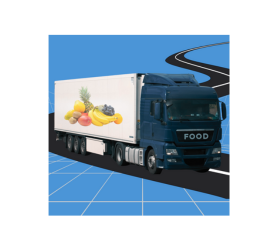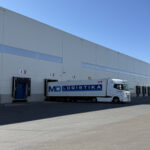Efficient food logistics: The technologies behind freshness

Logistics in the food sector is one of the most complex disciplines within the entire supply chain. Ensuring freshness and quality of food is not just a question of fast transportation – precise processes, consistent monitoring of the conditions, and smart technologies play a key role. Even a short-lived outage of refrigeration can translate into significant losses. Success, therefore, lies in the well-set orchestration of all links – from storage to handling to distribution.
Quality without compromise: What does food logistics entail?
In today’s highly competitive environment, it is essential to get fresh food to consumers quickly, safely, and in perfect condition. This applies to both raw materials for manufacturers and finished products destined for retailers or gastronomy. Food logistics, therefore, requires not only perfect coordination, but also absolute reliability with high demands on hygiene and safety.
The biggest challenge? Stable temperature without exception
Proper temperature regimes during transport and storage are the alpha and omega of success. Chilled and frozen goods must be constantly monitored and protected from temperature fluctuations. That is why more and more companies are turning to modern technologies – such as intelligent sensors, advanced cooling systems, and software solutions that enable real-time tracking of shipments.
LORI: The digital brain of food logistics
One of the proven tools for managing food transport is the LORI system from OLTIS Group. It is a comprehensive solution that covers the entire process – from receiving orders through planning and execution to invoicing and back-analysis.
The LORI system collects data from internal systems, GPS, map data and IoT sensors. Thanks to this, it can effectively plan routes, assign vehicles and drivers, and provide them with information via the TABLOG mobile application. Drivers can enter operational records, scan documents, and record any changes in real time.
Automation in practice: From order to invoice
Thanks to the API connection, orders can be accepted automatically without the need for manual intervention. LORI then creates an optimized transport plan, which is immediately available to drivers. After the transport is completed, the system automatically prepares all invoicing documents, inclusive of temperature records, and provides the customer with complete documentation.
Data as the basis of strategic management
Efficient logistics cannot be done without quality reporting. LORI enables not only operational management, but also advanced analysis and strategic planning. Companies thus gain an overview of the performance, identify weak points, and optimize their processes in a targeted manner.
Practical example: MD Logistics
The LORI system in this context has been successfully adopted, for example, by MD Logistika, which provides comprehensive food distribution within the Czech Republic and throughout Europe. It has a modern fleet of 250 vehicles, including subcontractors, that meet EURO 5 and 6 emission standards. Thanks to the LORI system, it is able to respond to very specific client requirements and flexibly adapt its capacities to the current market situation.
Conclusion: When technology decides quality
Effective food logistics is now inherently linked to digitalization. Systems like LORI significantly increase transparency, shorten reaction times, and enable companies to maintain high quality standards even under increasing market pressure. Anyone who wants to be competitive in food logistics cannot do without the smart tools of today.
Radomir Baca
Business Manager
OLTIS Group

